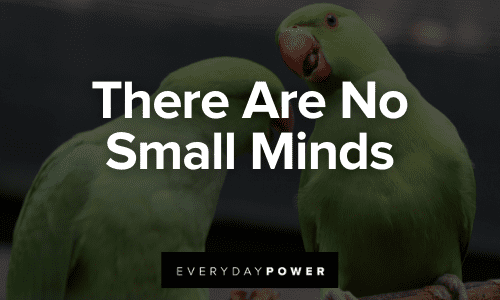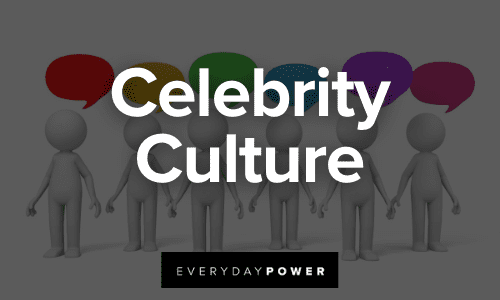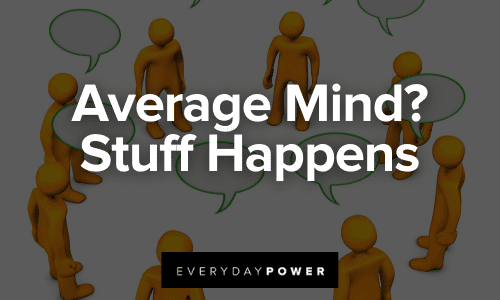The Quote ‘Small Minds Discuss People…’ is Wrong
“Small minds discuss people. Average minds discuss events. Great minds discuss ideas.”
This is a quote misattributed to both Eleanor Roosevelt and Admiral Hyman Rickover.
Regardless of the speaker, it raises interesting ideas but raises them in a manner that more or less defeats the implied judgment.
If it is small-minded to judge people, is that not precisely the effect of this quote?
Let’s take this a little higher.
There Are No Small Minds

The richness of our lives is in our connections with others.
I don’t mean friendships or family.
How we treat others reflects how we feel about ourselves.
When we criticize others, it is because something hurts inside.
It attempts to ease the hurt but never produces more than momentary relief.
The underlying problem is our self-image.
What made me feel I am not good enough, or why is it I don’t like myself?
These things are almost certainly externally rooted.
It could be as simple as modeling the behavior of parents who didn’t feel good about themselves.
However it happened, it caused guilt, anger, or sadness to distort how we view ourselves.
When we’re down on ourselves, we reach out.
It is not something often done in a positive way.
We’re hurting and don’t know how to heal.
So what do we do?
Try to place someone beneath us.
It is an attempt to regain a higher feeling, but it is false.
We just don’t know what else to do, right?
There is no reason to feel bad.
It is a wake-up call.
Be thankful if you’ve talked about someone else because it is an effort to feel better.
The way to do it is to confront and let go of the feelings you have about yourself.
There are a few thousand authors ready to help.
Celebrity Culture

Let’s touch on this briefly because celebrity itself isn’t inherently bad or good.
It just is.
What some people do as a profession puts them in the public eye, and some of that public seizes on that famous person as, perhaps, an idol.
Role models aren’t a bad thing.
Who didn’t have a poster of an athlete or favorite musician in their room growing up? Sometimes the intensity of the interest goes even further.
When you don’t feel good about yourself, it is easy to look at others and say, “I wish I were just like them.”
The celebrity ceases to be a person and becomes more of an ideal.
This diminishes the value the admirer places on himself or herself.
It also ignores the humanity of the star, singer, or athlete.
Unlike criticism, this isn’t an effort to lift ourselves above others.
It is an effort to ignore ourselves and our poor sense of self by latching onto a positive image.
Just like criticism, however, any relief is temporary.
There are no small minds.
Rather, there are people who are hurt and do not know how to heal.
Because the hurt is internal, they look to feel better by focusing on external things, including people and sometimes events.
Average Mind? Stuff Happens

Again let’s examine the wording from the quote, “Average minds discuss events.”
Does the speaker mean to disparage the mind of a person who discusses events, or does he or she mean the “average person” discusses events?
That is much more palatable, and there is truth in it.
Getting caught up in the surrounding events is easy.
Many of these events affect people around us, perhaps even ourselves.
Sometimes we say, “I’ll be happy when…” a particular event occurs.
Events distract many people because they don’t realize the power they have.
They focus on events and hope for things to happen… because they believe events happen to people rather than people make events happen.
Some take a partial step away and recognize that people cause things to happen.
However, the persons capable of these causes and effects somehow include just about everyone but themselves.
This pattern of thought is common.
Even if it is plain to see how a friend affects change in her life, she may not see it.
It comes down to this realization: you are responsible for the events you experience.
When you received a promotion or raise, how did it happen?
Was it magically given, or was it earned?
When focused on events, we think the manager “gave” it to us.
Reading it here and now, that logic seems flawed, right?
“What do you mean? I put in the work!”
Yes, you did.
You set a desired outcome and took the necessary action to see it come true.
Claim Your Power

Let’s graph it out just to be sure.
The symbols are arrows:
Intent > action > events > result
Many of us only think in terms of events.
I want to be well thought of, so I work hard.
We don’t think of a larger picture.
Sometimes we borrow intent from others and substitute their vision for our own.
We let the company determine our goals.
This is just part of the puzzle.
Your intent matters.
Nothing can replace your desires in terms of motivation.
Your intent and the desired outcome are the significant factors, not the actions and subsequent events.
Why?
Because we cannot always—or even often—prescribe what actions to take.
What if your desired outcome is ownership of a yacht?
Is there only one way to achieve it?
Of course not, so your intention guides and inspires action.
Intention (your goal) is ultimately responsible for the outcome because it starts every action taken to get there.
Put another way, our intent determines every event that occurs on the way to our desired outcome.
Inspired action rarely occurs when we “borrow” vision.
Think about it.
Our dreams occupy our thoughts.
We don’t sit and daydream about someone else’s vision.
Is the purpose of your efforts to make others happy?
No.
Your responsibility is to you first.
We cannot make others happy when we are not.
Don’t Get Stuck

We sometimes get stuck in the middle of the equation.
How could we not?
Many of us had an upbringing where our parents thought the key to happiness was a steady job you worked for 30-plus years, then retired.
See how that vision lets the individual off the hook?
Suddenly, it is the employer’s responsibility to make you happy, not yours.
Except it isn’t an employer’s duty.
An employer may do many things to attract a quality workforce.
However, they have no obligation to heed your hopes and dreams beyond how they affect your professional life.
You will be disappointed if you rely on others to create your happiness.
Your intent, desired outcomes, and goals all give meaning to your actions.
If you have difficulty articulating these goals, you are not alone.
That is a challenge to overcome.
When you do… that is when life ceases to be a series of events.
It becomes something you direct and control.
It becomes fulfilling and vibrant.
Great Minds
The last part of the quote, “Great minds discuss ideas,” is the least problematic.
However, it doesn’t take a great mind to lead a great life.
Likewise, a brilliant mind guarantees nothing.
“Discuss” seems passive.
Perhaps it is a misunderstanding of the quote, but the mental picture shows a learned group sitting around talking.
Maybe the ideas are great, but what happens to the idea if they are not executed in some fashion—a scholarly paper or practical application?
It simply fades.
Thus are the great visionaries of our time condemned to anonymity.
An idea needs a form of some sort.
Let’s parse the quote a little more and replace “great” with “engaged.”
We’re all in favor of greatness, certainly, but let’s not weigh down our efforts by attaching too much expectation.
Nor should we saddle the hopes of someone who has the next great idea with the thought they have to be some sort of genius.
They don’t.
The only thing needed is a mind dedicated to realizing the idea.
We’re left with something like “engaged minds illustrate ideas.”
“Illustrate” covers both the discussion of the idea and its execution.
It seems much easier to be commendable as opposed to great.
Anything that diminishes our perception of what is possible is a limiting belief.
How does a commendable mind illustrate an idea?
Reread the “average” section.
It is all there.
We take our idea—our intent—and make it a reality through inspired action.
Put It Together
The only problem with the statement, “Small minds discuss people; average minds discuss events; great minds discuss ideas,” is that it is all wrong.
Well, let’s say it is poorly executed.
Here is our new version:
“Hurting minds discuss people. Distracted minds discuss events. Engaged minds illustrate ideas.”
This is true to life.
It’s instructive.
It is attainable.
What do you think about the ‘Small minds…” quote?
Let us know in the comment section!












Paul
October 13, 2023 at 11:10 AM
Closed minds discuss people.
Narrow minds discuss events.
Open minds discuss ideas.
CJ Garibay
September 20, 2023 at 12:59 PM
“If it is small-minded to judge people, is that not precisely the effect of this quote?”
You started with a bad premise; anything built atop that is bound to fail. “Discuss” does not translate to “judge,” and reinventing the meaning / wording of the quote to suit your “interpretation” (read: fabrication) is intellectually dishonest.
Torrey
May 29, 2023 at 9:39 AM
This article was just a glorified cry-fest because the original quote obviously hurt your feelings.
Since when did “discuss” mean the same thing as “judge”?
Dorohi
May 18, 2023 at 6:48 AM
there were people who lived by quotes. Now, there are people who tries to change them – attesting their own version. God knows what made them qualify to redefine old sayings. Could have used that energy to inspire others rather than rambling around.
“Small minds discuss people. Average minds discuss events. Great minds discuss ideas.” This doesn’t fixate the fact that great minds can’t talk about people or events. Ofcourse, its okay to do so in a limited proportion. But ideas are what they mostly live by.
“As a man thinketh so he becomes”. 😉
Doug
January 9, 2021 at 10:49 AM
I think I’d further refine it to the following:
Self-centered minds gossip about people.
Distracted minds discuss events.
Engaged minds expand on ideas.
Or maybe this is more apropos?
Do not spend your time today belittling others’ faults
Or while away the minutes on events the news exalts
But seek to focus time each day in making understood
Agape love that fills our hearts and does our neighbors good
HYE
May 13, 2020 at 5:31 AM
I read the article in its entirety though I haven’t read any of the other comments. I gotta say your assertions are quite the stretch – and swapping out words as you desire: ‘discuss’ becomes ‘judge’ – you don’t understand the meaning of the quote (your substitution of ‘judge’ is the smoking gun proof of that). Discussing the ideas and opinions of others does not constitute discussing people, nor judging them. Discussing the latest gossip about what they wore and where they went and with whom – that is small minded.
And another thing: you got the quote wrong, backwards in fact; it starts with “great minds…” and ends with “small minds…”
And why even mention that the quote is misattributed without suggesting another name? Sloppy and all based on misguided opinions presented as truth and fact rather than as the opinions that they truly are.
Bob E.
November 22, 2019 at 2:57 PM
The context does matter to how this saying comes across. A decade ago, I twisted the saying for a good purpose. When my daughter was gossiping meanly with friends about others at school, I would remind them:
Small minds talk about other people. Mediocre minds talk about things (clothes, cars, accessories, etc.). Great minds talk about ideas.
Nevertheless, I’ll send these ideas along to that daughter to see how she can sharpen her understanding of why some people talk ill of others and why explaining and applying great ideas is excellent. Thanks for rethinking the saying, Chris.
Costumelooks.com
October 2, 2019 at 6:12 AM
Perhaps you have heard the little epigram which goes like this: Great minds discuss ideas, average minds discuss events, and little minds discuss people. Those who spend most of their discussion time in talk about people and events are not intellectually mature.
Roland Bernett
July 29, 2019 at 7:14 PM
Even great minds have to deal with eating, sleeping, shopping for essentials (events/things) and making decisions about who to buy/interact with (people)!
Chris Oler
July 30, 2019 at 10:06 AM
Thanks, Roland. How do you suppose a “great” mind’s approach to those things differs? Thanks for your comment.
Dan Hunt
May 24, 2019 at 6:28 PM
So, I discuss the ideas of politics and the unreasonable events of war. I’m sure, some of you will call this small minded, and I do protest. The greatest events are too often lit up by the media as great events. They are not great events and wars are mostly started by the big money guys trying to own our whole world as as they do this billions of people suffer from the huge monetary and people costs of continuous war mostly supported by the USA.
You may want to be like the guy the invented the light bulb. But would you like to be like the ruthless man Edison was?
Saul Luizaga
March 1, 2019 at 8:41 PM
No that’s not what that quote means, it means think constructively, efficiently and make it worth your time, so no it doesn’t defeat the purpose. Don’t judge people is a religious construct, of course we can judge people, but out of Knowledge and Truth, as opposed as how people does it mostly: from ignorance and envy/jealousy. The subject is the human mind and how best use it, not the people they belong to. There are no small minds? compared to what/who? that’s very subjective and you shouldn’t affirm it; also there are people that are naturally mentally limited, they don’t have a high IQ or they were taught to think in a very simple and/or stupid way, because they’re stupid themselves so they refuse to learn or think better, or they didn’t have the chance to learn or didn’t know where/how to get knowledge, those are small minds, but yes, the human mind is a complex and amazing organ, because the brain is amazing, and for the most part the mind that seeks knowledge, learn to think better, be efficient and humane, pretty much anyone can, the Brain is the only organ that can improve itself, but we must be realistic to how usually people use theirs
Chris Oler
March 2, 2019 at 7:37 PM
Thanks, Saul. Everyone is welcome to his or her interpretation and I am fortunate to have developed one on this quote that I think is positive and beneficial to others. That does not mean it is the only interpretation that can be! All bests and thank you for reading.
charles cooper
March 1, 2019 at 10:06 AM
Hello Chris, enjoyed your well-written article. Especially apropos to your own twist on the quote ‘Hurting minds discuss people. Distracted minds discuss events. Engaged minds illustrate ideas.’ Played around with my own version to capture a similar meaning as you implied from the original quote often attributed to Elenor Roosevelt.
If the common source of this quote is wrong who is the source? I would like to know. Don’t want to misquote somebody. You must have some basis for your statement besides conjecture.
Agree with Becky of Dec 2018
Thanks for an intellectually stimulating article.
charles
Chris Oler
March 1, 2019 at 4:36 PM
Thanks, Charles. The quote is as often credited to Admiral Hyman Rickover, but when he used the words in a Saturday Evening Post piece, he quoted them as from “the unknown sage.”
The words seem to go back some time and first appear in print in 1931. It appeared along with a request to determine its origin. Of course, 1931 predates FDR’s time in office and the emergence of Eleanor Roosevelt as a public figure.
No one has ever offered when or where Ms. Roosevelt stated or wrote the words. Given that the two figures were contemporaneous, I don’t think the Admiral would have missed crediting her. There is some evidence it may have originated with historian Henry Buckle decades before in the mid 19th Century.
Thanks for reading, Charles! I also appreciate you bringing this up because I love a good mystery. Unfortunately, I’m not sure this one was solved.